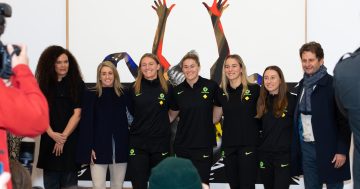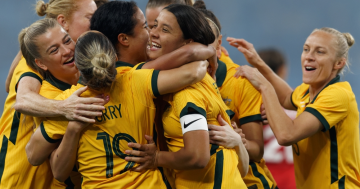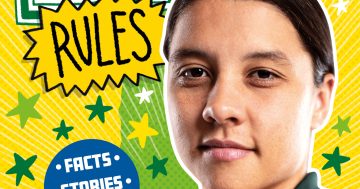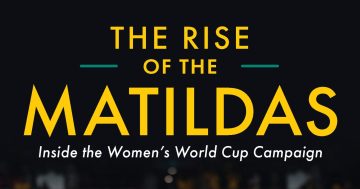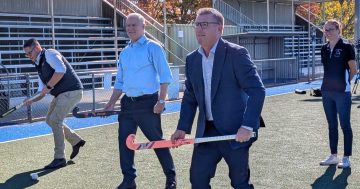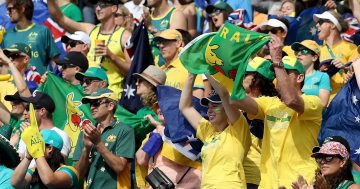Spaceship says there are three lessons on investing everyone can learn from the FIFA World Cup.
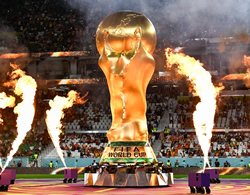 Every four years, after a series of qualification games, the top 32 international football (soccer) teams face off during a series of knockout rounds until one of them reigns supreme and wins the FIFA World Cup.
Every four years, after a series of qualification games, the top 32 international football (soccer) teams face off during a series of knockout rounds until one of them reigns supreme and wins the FIFA World Cup.
It’s one of the biggest global events and there’s a lot it can teach us about our own game – long-term investing.
Let’s get to it.
- You need a diversified team
A successful football team is like a successful long-term investment portfolio – diversified and balanced.
You can have the world’s best player and still not win the game if the rest of your team isn’t up to scratch.
Take Messi.
Arguably the world’s greatest player (Ronaldo fans can @ us), Lionel Messi’s job in a World Cup is to score goals for Argentina.
Meanwhile, at the back of the pitch, keeper Emiliano Martinez is tasked with stopping any goals from being scored against Argentina.
The rest of the team is made up of attackers, defenders, and midfielders.
Each player has a different role and is selected for their individual skill, and how well they fit into their coach’s vision for the team.
On a football pitch, it doesn’t matter how many goals you score, if your opposition scores more.
In the first round of the 2022 Men’s World Cup, Saudi Arabia beat Argentina.
It’s been called one of the biggest upsets in a World Cup ever.
Messi scored once, but Martinez (and the rest of the defense) let two goals in.
The Saudis were arguably better diversified across the pitch and could take their moments when they came.
When it comes to investing, diversification helps smooth out volatility, leading to steadier returns.
If you’re diversified, it means you’re not just counting on one player to score all the goals, or to make all your money.
It doesn’t matter if one of them has an off day because everyone else is working to their strengths.
- You have to keep your emotions in check
England hadn’t won a World Cup since 1966.
At the 2014 World Cup, they didn’t even win a game.
In 2016, former English player Gareth Southgate was brought in as coach to turn things around for the 2018 World Cup.
And it worked: in 2018 they looked closer to World Cup victory than they had in a long time, progressing to the round of 16 against Colombia.
But then the game came down to penalties.
The thing about the English football team is they’re straight up not good at penalty shootouts.
They have a famous ‘penalty hoodoo’.
Even their coach is famous for missing one when he played for England.
The Guardian puts it best,
“All the numbers were against England going into the penalty shootout against Colombia.
“England: three defeats from three World Cup shootouts; six defeats in seven shootouts in major tournaments.
And with a 14 per cent win percentage, the worst of any national team with more than five shootouts to their name.”
But penalty shootouts, like long-term investing, are about tuning out the noise of the crowd.
…the superstition of the media, and years’ worth of headlines.
And just like investments, past performance doesn’t always indicate future performance.
The players had to believe in themselves and their preparation.
They had to back themselves, trust the process – and ignore everything else.
While England didn’t end up winning the World Cup, they did beat Colombia on penalties and make the semi-finals – their best result since 1990.
- You can shape the world you want to live in
Long-term investing is about making active choices about what you believe in and why – and then backing it up with action and commitment.
There’s no shortage of controversy at World Cups.
FIFA and national federations make some pretty cooked decisions, including which nations get to host the tournament, and how much commitment they’ll show to equality and diversity.
In 2017, Norwegian football player Ada Hegerberg was just 21 when she quit the Women’s National Team to protest against gender inequality.
This was a huge loss as, just one year later, she became the first Ballon d’Or Feminin winner which is awarded to the best women’s player in the world.
The world’s best player stayed true to her word, boycotting the 2019 Women’s World Cup.
“I felt this weight on my shoulders more and more: This isn’t working.
“When you’re quite sure about yourself and the values and where you want to go, it’s easy to make difficult choices,” she said.
The Socceroos called for active change.
This year, before the Qatar World Cup, the Australian football team, the Socceroos, were the first to call on FIFA to improve workers and LGBTQI+ rights, releasing a video calling for active change.
These players remind us that we don’t have to take it: we can put our money where our mouths are and stand up for what we believe in.
If we believe in Where the World is Going, we can invest in it.
If we believe in an ethical, equal world, we can invest in it.
We can create change.
What can the World Cup teach us about long-term investing?
And how important are diversification, focus, ethics and consistency when it comes to managing a portfolio?
We asked our Spaceship Voyager investment team.
Managing an investment portfolio is about understanding the drivers of businesses.
Real companies – we don’t think of them as stocks trading on the market.
Take Amazon: in December 1999, Amazon’s share price was over US$4.70/ share.
A year later after the dot-com crash, the share price fell under $0.70.
Over 85 per cent of Amazon’s market value was wiped out in a single year.
In an interview, Jeff Bezos was asked how he navigated that time for the business.
He said that while the share price was falling week after week, the operating metrics of the businesses were actually improving.
He learned to tune out the noise and focus on building the best product for the customers.
The share price of Amazon is currently over $93, up 132x in two decades despite the 45 per cent correction this year.
Amazon is a good example of a business that did not get complacent and diversified.
They started with an online store for books, but realised that the online selling model can be replicated to other categories and diversified their product offerings.
One of their pain points was the existing cloud solutions at the time.
They found an opportunity and launched Amazon Web Services.
As their business grew, they realised they were processing large order volumes but were relying on third party logistics providers to deliver them to customers.
They wanted to control the end to end customer experience and it led them to expand into fulfilment.
Despite all the new entrants, Amazon has about 40 per cent market share of e-commerce in the US, and online retail is still just over 20 per cent of total retail in the US, the runway for growth is long.
Amazon is now ramping up their private label, as well as advertising for their sellers where Amazon has already become the third largest advertising platform in the US after Google and Facebook.
At Spaceship, our investment philosophy is to invest Where the World is Going (WWG).
We look for businesses that have economic moats (like the line of defence in football); businesses that differentiate their product/ service and prioritise customers; nusinesses that have a long runway of growth and can innovate with the changing times.
There is a lot of speculation and noise in the short term, but as long as companies deliver for their customers and grow their earnings, the share price will eventually follow.
*Spaceship was founded in 2016 with a single mission: to enable people to invest in their future, so they can live the life they want to live.
This article first appeared at spaceship.com.au.


